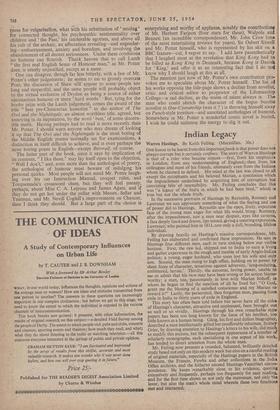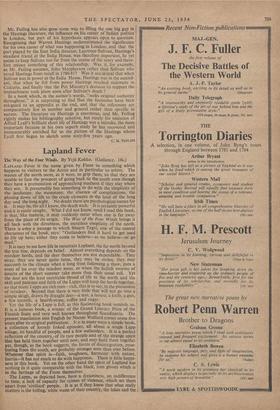'Indian Legacy
Warren Hastings. By Keith Feiling. (Macmillan. 30s.) ONE lesson to be learnt from this important,book is that power does not always corrupt but it certainly confines. The story of Warren Hastings is that of a ruler who became remote —first, from his employers in London, from any understanding of England; then from his colleagues and most of his friends, ultimately even from the Indians whom he claimed to defend. His mind at the last was closed to all except the sycophants and his befoved Marian, a conclusion which the impeachment underlined by acquitting him of corruption but convicting him of insensibility. Mr. Feiling concludes that this was "a legacy of the India in which he had been bred," which is true but not the.whole truth.
In the successive portraits of Hastings by Reynolds, Romney and Lawrence we can appreciate something of what the feeling and use of power did to Hastings. Reynolds saw the open, lively, expectant face of the young man eager for what life would bring: Romney, after the impeachment, saw a man near despair, eyes like caverns, a face deeply lined and drawn, lips tensed, giving a sneering expression. Lawrence; who painted him in 1811, saw only a dull, brooding, lifeless individual.
By drawing heavily on Hastings's massive correspondence, Mr. Feiling has elaborated and confirmed these impressions. He sees in Hastings four different men, each in turn sinking below our visible horizon. First, the raw lad, shipped out to India to earn a living and gather experience in the rough and tumble of early Anglo-Indian politics; a young, eager husband, who soon lost his wife and only son. Second, the man rising to high office, holding on to power by sheer force of character, tenacious against adversity, long-enduring, embittered, heroic.' Thirdly, the autocrat, loving power, unable to see or admit that his view may have been wrong or his action blame- worthy; a man, too, passionately in love, with Marian Imhoff, in whom he began to find the sanction of all he lived for: "0 God, grant me the blessing of a satisfied conscience and my Marian to reward it!" Lastly, the persecuted, then forgotten man, passing from exile in India to thirty years of exile in England.
This story has often been told before but never have all the sides of Hastings's character, attractive and unpleasant, been brought out so well or so vividly. Hastings through his own remarkable state papers has been too long known for the force of his intellect, too little known as a human being. Gleig, his first and dullest biographer, described a man intellectually gifted but insufferably inhuman. Sydney Grier, by drawing attention to Hastings's letters to his wife, did much to modify this picture, but the subsequent appearance of a number of scholarly monographs, each specialising in one aspect of his work, has tended to divert attention from the whole man.
Mr. Feiling now presents a rounded, balanced, brilliantly detailed study based not only on this modern work but also on a careful reading of original materials, especially of the Hastings papers in the British Museum, the Francis, Fowke and other collections in the India Office archives, and the hitherto unused Hastings-Vansittart corres- pondence. He keeps remarkably close to his eviderice, quoting extensively and frequently, perhaps too frequently for easy reading, and for the first time shows us not only the statesman, not only the lover, but also the man's whole mind wherein these two functions met and interacteda
Mr. Foiling has also gone some way to filling the one big gap in the Hastings literature, the influence on his career of Indian politics in London, but part of his hypothesis appears open to question. Recognising that Warren Hastings underestimated the significance for his own career of what was happening in London, and that the part played by the East India director, Laurence Sulivan, Hastings's steadiest friend at the India House, was therefore important, he yet seems to keep Sulivan too far from the centre of the story and there- fore misses something of this relationship. Was it, for example, as Mr. Foiling assumes, John Macpherson rather than Sulivan who saved Hastings from recall in 1780-81? Was it accidental that when Sulivan was in power at the India House, Hastings was in the ascend- ant, that when he fell from power Hastings reached stalemate in Calcutta, and finally that the Pitt Ministry's decision to support the impeachment took place soon after Sulivan's death ? In a book which, in the author's words, "seeks original authority throughout," it is surprising to find that the footnotes have been relegated to an appendix at the end, and that the references are comparatively few in number and general rather than specific in nature. The literature on Hastings is enormous, and Mr. Felling rightly makes his bibliography selective, but surely his omission of Alfred Lyall's brilliant short life of Hastings was a mistake, the more important because in his own superb study he has recovered and immeasurably enriched for us the picture of the Hastings whom Lyall first began to sketch some sixty-five years ago.



































 Previous page
Previous page